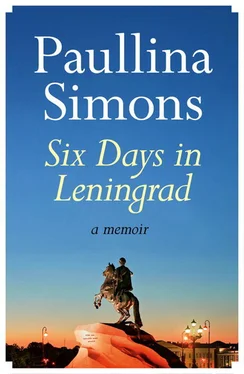Where was breakfast? I was starving.
Breakfast was served to me on the plane at eight in the evening U.S. time. I was fed roast beef that was not considered by Russians to be a perishable food, so it was room temperature. It was served with another 125 grams of roll, and a slice of pale tomato.
We were told by the captain in Russian first and then reluctantly in English that the temperature in St. Petersburg was 18 degrees Celsius. We were landing. It was raining.
Before we landed, the missionary leader went around and told his people that they had to chronicle the trip in their diaries. “What has the trip been like from God’s perspective?” he asked. I really wanted to know what the girl sitting next to me, who couldn’t muster any interest in my brainless magazines, thought about God’s perspective, but I couldn’t read her handwriting. When we landed at Pulkovo, all the missionaries clapped.
I wanted to see out my window what St. Petersburg looked like at six in the morning in the rain, but all I saw was wet buildings and tarmac. And uncut grass.
Inside the terminal, I expeditiously got in line for passport control. The two women behind me clucked away in Russian. I made a mental note to stop being surprised at hearing Russian all around me. It was the rule now, not the exception. The two women were talking about the missionaries. One of them said, “Yeah, I wish them well, but I think they’re going to have a hard time over here.”
I don’t know why the Russian woman thought the missionaries would have a hard time over here. Unless it was because they didn’t speak a word of Russian.
Now that time was no longer of the utmost essence, my garment bag rolled down instantly. I had to fill out a customs form on which I wrote that I was bringing in six hundred American dollars and not much else. Oh, and a camera.
No one checked my bag. When I was waiting in the customs line, the control officer suddenly got up and walked away. I stood dumbly for about five minutes, and then concluded he was not coming back any time soon, so I went on another line. It was a good call, for he had permanently disappeared.
The international arrivals area was jammed with people who did not move out of my way to let me pass. I came to an impasse with one man, who glared at me, at my bag, and then finally stepped half a hostile foot back. I may have run over his foot with my bag as I wheeled by.
I saw a sign in Russian that said, полина саймонс. I went over to that sign. It was held by a skeletally thin man of indeterminate age with big lips and blue eyes. He was Viktor Smirnoff, our driver for the week.
When we came to his car, we found it trapped between two other vehicles with no way out. There were no lanes marked out within the parking lot and no parking stalls either, so the cars were parked wherever and driven wherever. The parking lot at Pulkovo International Airport was very small, half the size of the one at the Appleton, Wisconsin, a tiny local airport where I’d gone a year earlier for a book event.
In any case we were stuck and Viktor had no plan.
After some minutes of sitting in the car, silently staring at the terminal building as if for guidance, a car mercifully pulled out in front of us and we started to drive out. Immediately another car approached to take up the space. Viktor and the other driver sat and looked at each other. Viktor motioned in the direction of… I don’t know. Possibly the exit, though it was hard to tell where the exit was. After Viktor motioned, the other man motioned also. Viktor nodded. The other driver rolled his eyes, but reversed his car a few feet, just enough to let us pass.
All I wanted to do was look at the countryside. Pulkovo is twenty kilometers south of St. Petersburg. The Germans bombed Leningrad from Pulkovo Heights for the duration of the war — before the airport had been built. I expected to see the foliage of northern Maine in the trees and the leaves and the fields. But I didn’t recognize Maine in the countryside near Pulkovo. It looked flat and slightly swampy, a bit like Holland. With the tall overgrown grasses, my first impression was of something rural and unkempt. I didn’t see the skyscraper pines of Maine, nor the sugar maples of New England, nor the white cedar-shingled farmhouses.
It had stopped raining. The sun was peeking out.
In Viktor’s little white Volkswagen, we drove to St. Petersburg on the Pulkovo Shossé or highway. The traffic signs looked a lot like those coming out of Gatwick in London, except in another language.
Also — are the roads near London much smoother or is that just my imagination?
On a map, Leningrad looks like a glob of cotton candy surrounded on two sides by water — Gulf of Finland to the west, Lake Ladoga to the east. The city was built in the narrow neck of a wide isthmus, on the banks of the mouth of the River Neva.
To the north is Karelia and farther north and northwest is Finland. The Finns and Russians have fought bitterly over the Karelian Isthmus for three hundred years, ever since Peter the Great built Leningrad in the swampy mud and then wanted to put some distance between his window-to-the-west city and the Finns. The Karelian Isthmus exchanged hands a number of times, the last time during the Second World War. Today, nearly all of it belongs to the Russians. The Finns had sided with Hitler, and so to the victor went the spoils.
Lake Ladoga is the largest lake in Europe. The Neva is formed in this lake and flows 73 kilometers to empty into the Gulf of Finland just outside city limits. In fact, the Gulf is the city’s limits. South is where the rest of Russia lies, and it was south where the Nazi Panzer tanks stood in a semi-circle at the bottom of Leningrad for three years from 1941–44. The German-Russian southern front looked like a smile on the face of death. The Germans knew they didn’t have to encircle the entire city. Finland, a German ally, stood ready to fight the Red Army north in Karelia, and to the east and west there was water. The Nazis only had to worry about the south. It looked so foolproof that Leningrad would starve and surrender, in that order, that Hitler booked the Astoria Hotel in Leningrad for a victory celebration. The invitations had been printed, with the exact time of the party. Only the date had been left blank.
Hitler never set foot in Astoria.
He was too busy keeping his men from frozen collapse during the invasion of Moscow in October, 1941. Afterward a celebration was not possible because Leningrad would not surrender. Moscow would not surrender, Stalingrad would not surrender.
After Hitler lost the Battle of Moscow, the Battle of Stalingrad, and the Battle of Leningrad, it was just a matter of time.
Time and 20 million Soviet dead.
As we neared the city limits, the shossé turned into a prospekt, which is an avenue or a boulevard. I finally saw something familiar — a wide road with four-story buildings flanking it.
The buildings were in pretty bad shape. Their façades were finished in stucco in a pastel palette: blues, greens, yellows, grays. The paint looked to be pre-war, not that I would know what pre-war paint looked like. I don’t remember old paint from when I lived in Russia.
The buildings looked as if they haven’t been painted in decades. A little fresh paint would do wonders, I decided. Then I saw rotting window frames and chipped and unhinged doors. I wanted to look away, but there was nowhere to look.
In the movie White Nights with Mikhail Baryshnikov, Leningrad looked so beautiful and pristine. Had the film been made in a different city? I hear my father’s voice in my head from years ago. “Of course it wasn’t filmed in Leningrad. Who would allow them to come inside to make a movie about Baryshnikov of all people? It was filmed in Helsinki. That’s why it looks so beautiful.”
Читать дальше












